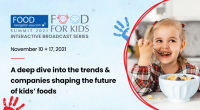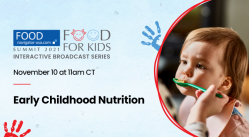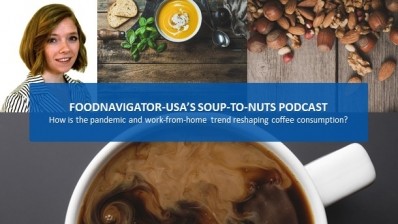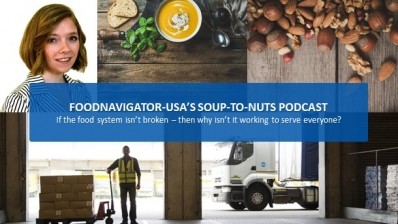Soup-To-Nuts podcast: Gerber examines parental pressures to better support kids in first 1,000 days
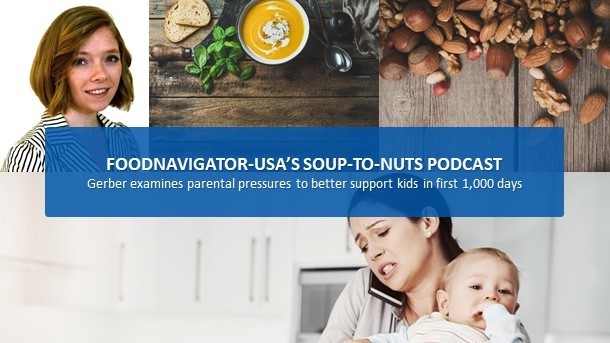
During this period, what expecting and nursing women eat and feed their children has an outsized impact on the development of their babies’ brains and bodies – which is why understanding what influences parents is essential for food manufacturers, public health advocates, policy makers and other stakeholders so that collectively they can ensure more children lead healthier and happier lives in the future.
With this premise, they hypothesized that happier parents raise happier babies, Gerber tapped the consultancy agency Kantar to survey and analyze the responses of nearly 9,000 parents in 16 countries in 2020 about the extent to which they believe parenting today is easy, full of challenges outside their control and whether they feel support as a caregiver.
The result is The Parenting Index – a first-of-its-kind framework for understanding the experience of parenting around the world today, and a roadmap for finding solutions to shared pain points.
In this episode of FoodNavigator-USA’s Soup-To-Nuts podcast, Nestlé SVP and head of Nutrition Thierry Philardeau shares some surprising insights from The Parenting Index, how the findings are influencing Nestle’s approach to product innovation and consumer communication and what more other industry players and stakeholders can do to better support parents.
[Editor’s note: If you are interested in learning more about children’s nutrition and market opportunities, register for FoodNavigator-USA’s FREE virtual Food For Kids Summit, at which you will hear directly from parents about their experiences and approaches to feeding their children. You will also hear from leading and emerging brands in the children’s food segment, public health advocates and other stakeholders about the importance of nutrition during the first 1,000 days of life.]
‘Not only let's say the nurturing babies and toddlers, but also supporting parents for a healthier life, a healthier future’
Since Gerber was founded more than 150 years ago, it has focused on meeting the nutritional needs of infants and babies with safe, high-quality products, but three years ago when the Nestle team was considering how the marketplace was evolving and how to fill unmet needs a simple question about parents’ impact on children’s nutrition revealed potential white space.
But before Nestle and Gerber could meet this demand, they needed to better understand it – giving birth to the idea for The Parenting Index.
Philardeau explained during a strategic planning retreat three years ago, the team realized that it could better fulfill its mission of nurturing a healthier generation if it also supported parents – because happy parents make happy babies, and vice-versa.
After reviewing available literature, the company realized there wasn’t enough ‘actionable’ data, and so it teamed with researchers at Kantar to survey parents in 16 countries to identify where they needed help and where they felt supported.
Gerber assumed one of the biggest pain points for new parents would be selecting an infant formula or baby food to feed their children. But the research revealed this was actually one of the easiest aspects of parenthood. Rather the top parenting pain points include internal and external pressure, finances, employer support, the perception of an easy baby, access to health and wellbeing resources, a supportive environment, shared parenting and parenting confidence.
Under pressure: Parents around the world navigate external and internal expectations
In the US, parents feel generally positive and recognize they have good access to health and well-being resources, but, like parents around the world they do suffer from external and internal pressures, which many report are magnified by social media.
“The paradox to us was” parents who are hyper-connected through social media and the Internet had more resources on which to lean than a “paper connected society,” but they also felt lonelier, Philardeau said.
“There is a lot to be made of shaming online. For instance, we could see that this has a huge impact on younger parents,” who are looking for role models but struggle to meet often unrealistic or conflicting expectations promoted online, he explained. This feeds into the ‘baby blues, which about 40% of US parents experience, versus 25% globally, according to the research.
These insights also are important for marketers and public health advocates hoping to connect with new parents as they shine a light on the current digital landscape and the type of positive messaging and reinforcement to which parents might best respond.
Gerber also is exploring how it can use these insights, social media and technology to offer more creative ways to alleviate pressure on parents. For example, by creating an AI-powered service that decodes what babies’ cries may mean.
US parents are more financially resilient, but struggle with work-life balance
The Parenting Index also revealed that many parents in the US place a premium on financial resilience and work-life balance.
Globally, 62% of people said that financial resilience is important when raising a baby, but in the US 81% of caregivers voiced this opinion – revealing a “key preoccupation” with finances that likely reflects a lack of government funded services, such as free childcare and education that are available in other countries, like Sweden.
To balance this, many Americans feel pressured to work more, which contributes to frustration with work life balance, Philardeau said.
He acknowledged that Gerber and Nestle have limited influence over governmental or institutional policies to support parents, but for its part it is trying to lead by example.
In 2019, it expanded its parent support leave for primary caregivers from 14 to 18 fully-paid weeks, extended leave for the parent who is not designated as the primary caregiver from one week to up to four fully-paid weeks and increased leave eligibility for adoptive parents of a minor children from under one year to age 18.
Most US parents perceive caregiving as unbalanced in their homes
Another major pain point for American parents revealed by the study was a drastic imbalance in shared parenting, which only 51% of US parents perceived as equally distributed in their household.
“One factor that is indeed very influential in the fact that you are happy parents or not, is called shared parenting – so the balance between the two partners in sharing the burden, sharing the joys of parenting, and sharing the resources,” Philardeau said.
He explained that the US falls alongside countries like Saudi Arabia, Nigeria and Romania on one extreme of the masculinity index which places a higher value for men on achievement and material rewards than on cooperation, modesty and caring for the weak, which is more closely aligned with shared parenting.
“This factor is something that I want to dig into,” because it influences how parents perceive their situation, responsibility and respond to communications around parenting and nurturing children – including what to feed them, Philardeau said.
‘It takes a village to raise a child’
Gerber does not plan to solve for all of these problems alone, and in some cases the best it can do is flag the pain points for other more experienced or appropriate stakeholders to address, but it does plan on paying closer attention to parents’ needs going forward – signaling a major shift in the company’s mission.
“One of the learnings that we got from this study is really about how it takes a village to raise a child, and that is more true than I though. So, in the services we are going to provide, of course not everything will come from Nestle because” they are outside the company’s area of expertise, “but by giving access to this information” to others with different areas of expertise “it is a way to provide a 360-degree solution for parents,” Philardeau said.
With this in mind, he explained that Gerber and Nestle have come to understand that if their mission is to help raise healthier children then they also have a responsibility to help parents do their job correctly.
“That is a big change in the mind of the company and the business teams, but it is also much richer in terms of the emotional territory and allowing us to create more bonds with our customers,” he said. “Its really the discovery of a new frontier.”
Dig deeper at Food For Kids Summit
Gerber has made available in detail the findings of The Parenting Index on its website for anyone to download and I encourage you to do so because it is rich in data that reveals not just parents’ pain points, but also market opportunities and insights for connecting with a powerful demographic group.
If you are interested in learning more from Gerber and others about developments in children’s nutrition, market trends or connecting with others in the space, I also encourage you to register to attend our virtual Food For Kids Summit. The event is free and will take place over two days – November 10, when we take a deep dive into early childhood nutrition, and November 17, when we explore the children’s snack space. You can learn more and register at foodnavigatorusasummit.com.
